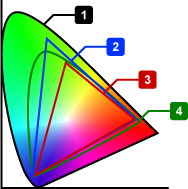About Color Spaces
What Is Color Space?
A color space is a range of colors that can be represented; each device has its own color space.
For example, when the same image is displayed on two types of monitor, the color tones may appear different from each other. One cause of this is the difference in color spaces.
Since the appearance varies by color space, it is important to consider color spaces when performing color management.
sRGB and Adobe RGB
While the color space varies by device, you cannot unify color tones under the use of different color spaces.
sRGB and Adobe RGB are color spaces designed to enable communication between devices in a unified color space. The graph below shows the color spaces of sRGB and Adobe RGB.
 Visible region Visible region |
 |
 Adobe RGB Adobe RGB |
|
 sRGB sRGB |
|
 Printer Printer |
|
Each color space has the following characteristics.
| sRGB | Adobe RGB | |
|---|---|---|
| Overview | An international standard established by the International Electrotechnical Commission (IEC) | A definition of color space proposed by Adobe Systems Incorporated |
| Characteristic | Widely used in general | The color space that can be represented is wider than sRGB |
| Advantage | Easy to handle since it is the range of colors that can be reproduced on many devices | Wide range of reproducible colors; vivid color reproducibility is especially high |
| Disadvantage | Narrower range of reproducible colors compared to Adobe RGB | The number of devices that can reproduce the wide color space is small |
![]() Tip
Tip
The Printer's Color Space
Canon PRO series inkjet printers can print in a color space wider than sRGB.
By using Adobe RGB, you can perform vivid printing in a wider color space, maximizing the printer's performance.
Color Space Settings in Professional Print & Layout
Professional Print & Layout automatically retains the color space set in the image editing software and converts it to an appropriate color space as needed. Therefore, color management can be performed without considering the color space.



